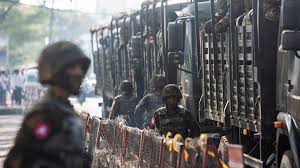On Myanmar, India needs a rethink
Last week, Myanmar’s army claimed success in retaking Myawaddy, a critical node in the bustling trade route with its eastern neighbour, Thailand. The anti-government coalition of the ethnic armed groups and the pro-democracy fighters had created a flutter in the region by entering Myawaddy in mid-April and ousting the troops from the army base there. The real winner in the see-saw battle now appears to be the notorious Border Guard Force (BGF) in the region, formally aligned with the military government in Yangon, but with great autonomy on the ground. The BGF is reportedly playing both sides in order to expand its own regional dominance. It also presides over a massive regional criminal network that operates gambling casinos, drug trade, and illegal trafficking on the Thai border. The battle for Myawaddy captures the larger story of the breakdown of the state in Myanmar.
Since its independence, Myanmar never enjoyed sustained control over all its territory. The conflict between the majority Bamars and several ethnic minority groups has left the state’s control over its frontiers shaky. But the situation has never been as grim as it is today. Since the unpopular and ineffective 2021 coup, the army has lost control over much of the troubled nation as the pro-democracy Bamar groups joined hands with the ethnic armed groups to end army rule. The country’s frontiers have always drawn trans-border networks of illegal groups. That attraction has grown now. As the threat from the collapsing authority of the Myanmarese state envelops the rest of the region, the intervention of external powers has become acute. While the main regional forum ASEAN has been unable to deal with the challenges, the great powers are stepping in. In the name of stabilising its frontier with Myanmar, China has inserted itself deeper into the nation’s internal affairs. The US supports the country’s pro-democracy movement and has given nearly $500 million assistance under the Burma Act of 2021. Some of this includes non-lethal military support.
Despite its profound impact on India’s internal and external security, there has been little debate in Delhi on how to deal with the Myanmar crisis. The time has come for the Indian government to rethink its earlier policy bias in favour of Myanmar’s army which is no longer in a position to secure India’s interests. Delhi must now begin a dialogue with Myanmar’s National Unity Government comprising the democratic opposition and the ethnic armed groups. While it should engage with the Army, of course, New Delhi must also open channels of communication with the local forces in control of the regions across the 1,600-km long land border with Myanmar. Playing defence by fencing the border with Myanmar is utterly inadequate in coping with the challenge on India’s eastern frontier.
